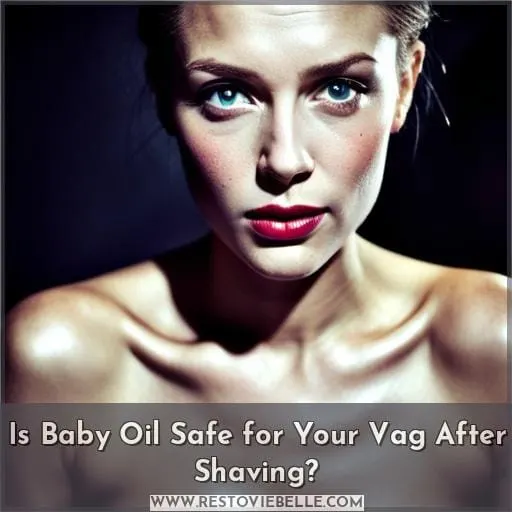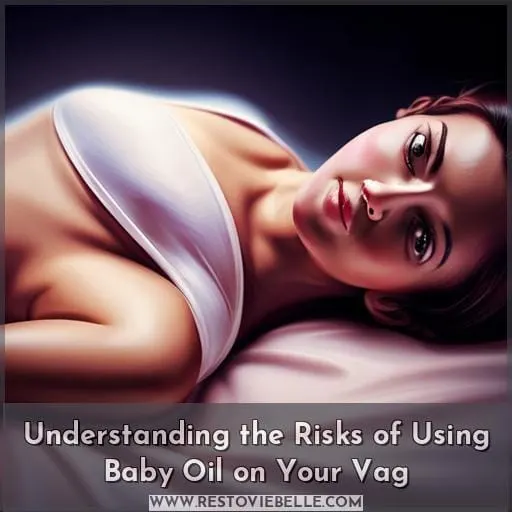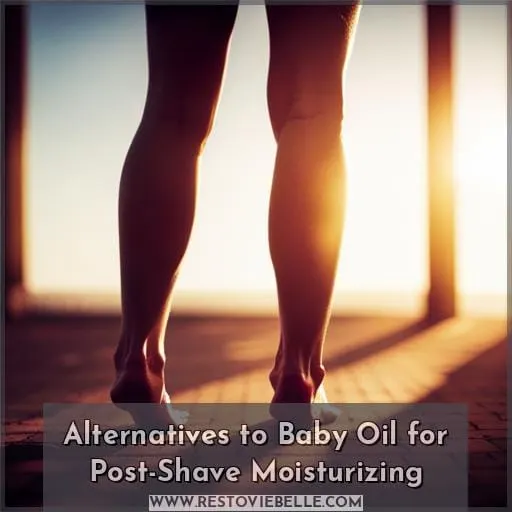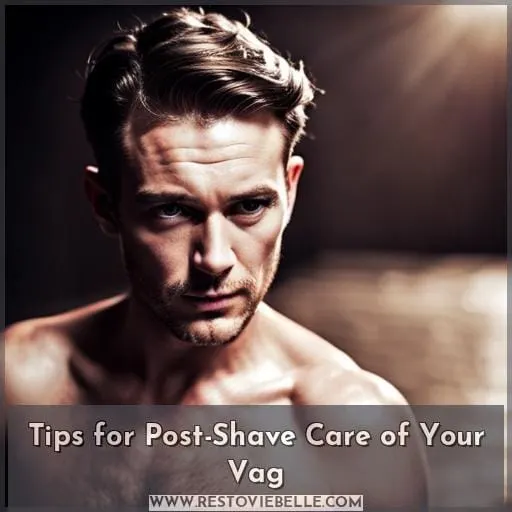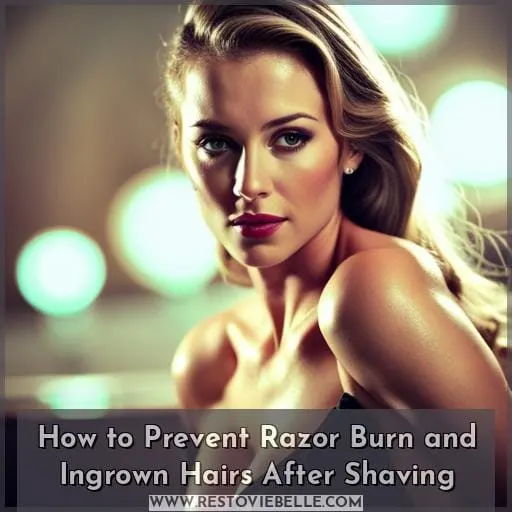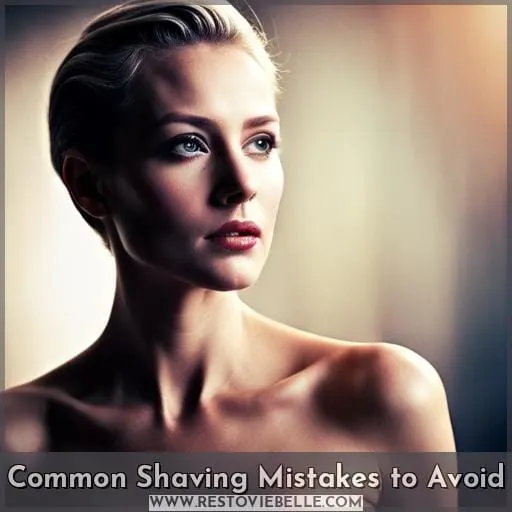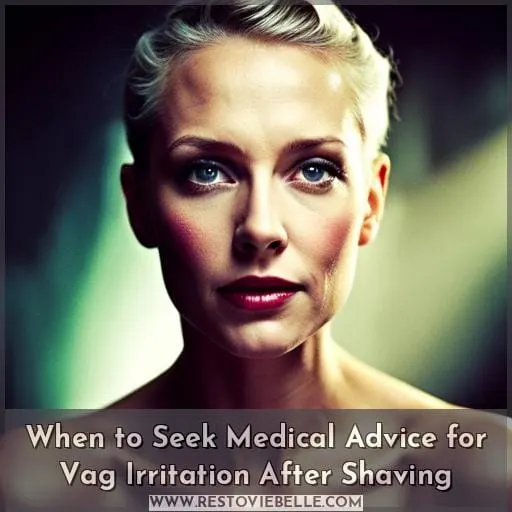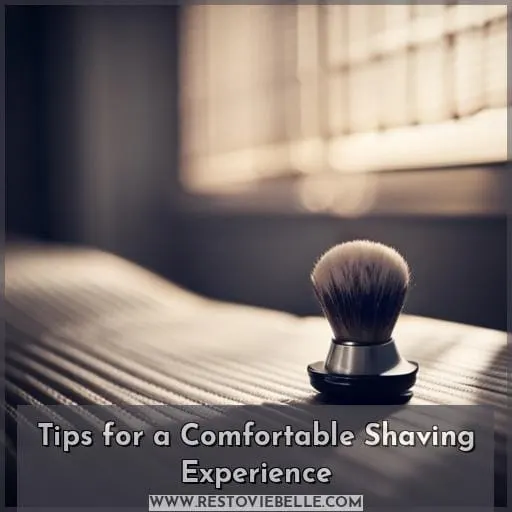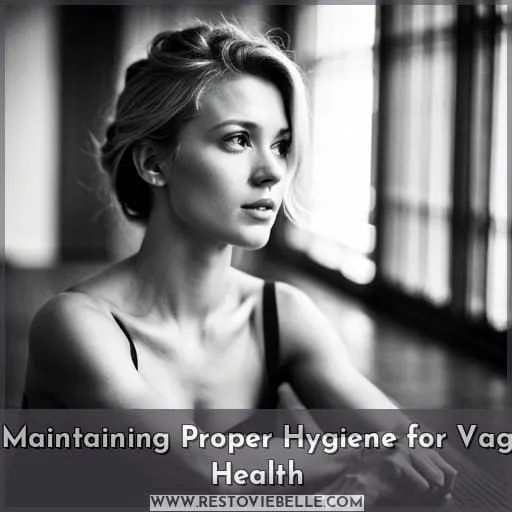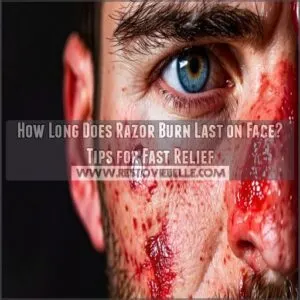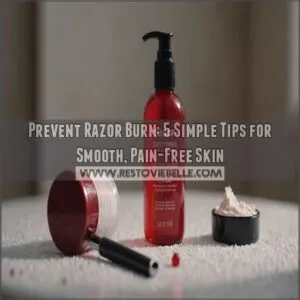This site is supported by our readers. We may earn a commission, at no cost to you, if you purchase through links.
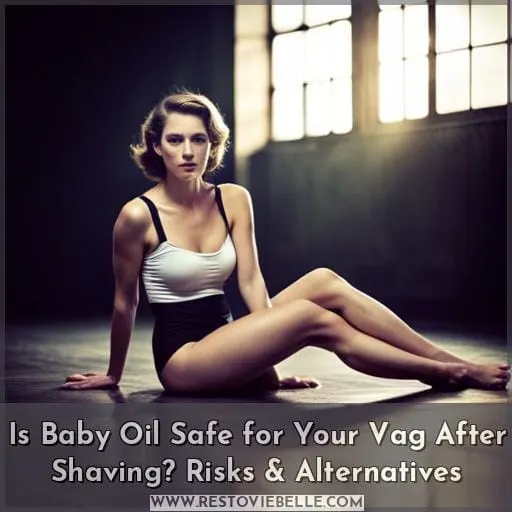
We’ll explore the potential risks and offer alternative options that can keep your skin happy and irritation-free.
Table Of Contents
- Key Takeaways
- Is Baby Oil Safe for Your Vag After Shaving?
- Understanding the Risks of Using Baby Oil on Your Vag
- Alternatives to Baby Oil for Post-Shave Moisturizing
- Tips for Post-Shave Care of Your Vag
- How to Prevent Razor Burn and Ingrown Hairs After Shaving
- Common Shaving Mistakes to Avoid
- When to Seek Medical Advice for Vag Irritation After Shaving
- Tips for a Comfortable Shaving Experience
- Maintaining Proper Hygiene for Vag Health
- Frequently Asked Questions (FAQs)
- Can baby oil be used as a lubricant during sexual intercourse?
- Is it safe to use baby oil on other parts of the body after shaving?
- Are there any specific precautions or considerations when using baby oil on the vaginal area after shaving?
- Can baby oil help prevent razor burn and ingrown hairs after shaving?
- Are there any potential side effects or risks associated with using baby oil on the vaginal area after shaving?
- Conclusion
Key Takeaways
- Baby oil may cause skin irritation and disrupt the natural pH balance in the vaginal area.
- Safer alternatives to baby oil for post-shave moisturizing include fragrance-free moisturizers and natural oils like coconut oil and olive oil.
- Proper post-shave care, such as rinsing with warm water and wearing loose-fitting clothing, promotes vaginal health and comfort.
- To prevent razor burn and ingrown hairs, exfoliate before shaving, shave in the direction of hair growth, and use a clean and sharp razor.
Is Baby Oil Safe for Your Vag After Shaving?
Using baby oil on your vagina after shaving isn’t recommended due to potential risks and alternatives available.
While baby oil may provide some lubrication and moisturization, it can also lead to skin irritation, itching, and discomfort in the sensitive vaginal area.
Instead of using baby oil, consider safer alternatives such as vaginal moisturizers specifically designed for post-shave care. These products are formulated to soothe the skin while preventing razor burn and ingrown hairs.
Additionally, you can opt for natural oils like coconut oil or olive oil that offer similar benefits without the risk of irritation. Remember to choose fragrance-free options to minimize any potential allergenic reactions on your delicate skin.
Prioritize proper post-shave care by rinsing with warm water after shaving, patting dry gently instead of rubbing vigorously, avoiding tight clothing that may cause friction or chafing, and refraining from scratching or picking at the shaved area.
Understanding the Risks of Using Baby Oil on Your Vag
Using baby oil on your vag after shaving can pose risks such as irritation and allergic reactions.
The sensitive skin in the vaginal area may react negatively to the ingredients in baby oil, leading to itching, burning, or rash.
Additionally, using baby oil increases the risk of developing vaginal infections due to its potential for disrupting the natural pH balance and promoting bacterial growth.
Irritation and Allergic Reactions
First, be aware of the potential risks and side effects associated with using baby oil on your vagina after shaving.
Using baby oil can lead to irritation and allergic reactions in some individuals. It may cause itching, burning, redness, rash, or soreness in the sensitive vaginal area.
To prevent these issues, consider alternative moisturizing options such as fragrance-free moisturizers or natural oils like coconut oil or olive oil.
If you experience persistent symptoms or severe reactions after using baby oil, it’s advisable to seek medical advice for proper evaluation and treatment.
Infection Risk
To reduce the risk of infection, you should be cautious when using baby oil on your vag after shaving.
Here are some tips to keep in mind:
- Cleanse the area before shaving
- Avoid sharing razors or other personal care items
- Consider using antibacterial products post-shave
- Opt for fragrance-free moisturizers specifically designed for sensitive skin
- Practice safe sex and maintain proper vaginal hygiene through regular cleansing.
Alternatives to Baby Oil for Post-Shave Moisturizing
When it comes to post-shave moisturizing alternatives to baby oil, there are a few options you can consider.
- Natural oils like coconut oil and olive oil provide hydration and nourishment for the skin without any added fragrances or irritants.
- Aloe vera gel is another soothing option that can help calm any potential razor burn or irritation.
- Lastly, fragrance-free moisturizers specifically formulated for sensitive areas can also be used as an alternative to baby oil for post-shave moisture.
Natural Oils (Coconut Oil, Olive Oil)
After understanding the risks associated with using baby oil on your vag, let’s explore some alternatives for post-shave moisturizing, such as natural oils like coconut oil and olive oil. These natural oils can provide hydration to prevent irritation and soothe the skin after shaving.
To help you compare these options, here is a table highlighting their benefits:
| Natural Oils | Benefits |
|---|---|
| Coconut Oil | Hydrates the skin, has antibacterial properties |
| Olive Oil | Moisturizes and nourishes the skin |
Consider trying these natural oils as safe alternatives to baby oil for your post-shave care routine.
Aloe Vera Gel
After shaving, you can consider using aloe vera gel as an alternative to baby oil for post-shave moisturizing. Aloe vera gel offers numerous benefits for the skin and can help soothe any irritation caused by shaving.
Here are three reasons why aloe vera gel is a great option:
- Hydration: Aloe vera has excellent moisturizing properties that can help keep your skin hydrated after shaving.
- Soothing Effect: The natural cooling effect of aloe vera helps calm any redness or inflammation on the skin.
- Healing Properties: Aloe Vera contains vitamins and antioxidants that promote healing and prevent infection.
By incorporating aloe vera gel into your skincare routine, you can enjoy smooth, nourished skin while minimizing the risk of irritation or discomfort after shaving.
Fragrance-Free Moisturizers
For optimal post-shave moisturizing of your vag, consider fragrance-free moisturizers as an alternative to baby oil.
Fragrance-free moisturizers are gentle on the skin and help maintain its hydration levels, preventing dryness and irritation after shaving.
Look for products specifically designed for sensitive areas or those labeled hypoallergenic to minimize the risk of any adverse reactions.
These alternatives provide effective nourishment without compromising your vaginal health or increasing the risk of infections.
Tips for Post-Shave Care of Your Vag
After shaving your vaginal area, it’s essential to take proper care to minimize any potential discomfort or irritation.
- Rinse the area with warm water to cleanse and soothe the skin.
- Gently pat dry with a clean towel.
- Avoid wearing tight clothing that can rub against the freshly shaved skin and cause further irritation.
- Lastly, resist the temptation to scratch or pick at any bumps or ingrown hairs as this can lead to infection and prolong healing time.
Rinse With Warm Water
To properly care for your vag after shaving, start by rinsing the area with warm water.
This simple step is essential in preventing irritation and promoting hygiene.
Warm water helps to cleanse the skin, remove any remaining shaving cream or gel, and soothe any potential redness or inflammation caused by shaving.
Remember to use gentle patting motions when drying the area afterward to avoid further irritation.
Pat Dry Gently
You should gently pat your vagina dry after shaving to avoid irritation.
Excess moisture can lead to skin irritation and increase the risk of razor burn or ingrown hairs.
Patting dry with a soft towel helps remove any remaining water without causing friction or rubbing against the sensitive skin.
It’s important to be gentle and avoid harsh movements that could cause further irritation.
Taking care during this step contributes to post-shave comfort and promotes vaginal health.
| Moisturizing Techniques | Skin Irritation | Vaginal Health |
|---|---|---|
| Rinse With Warm Water | Razor Burn Prevention | Post-Shave Care |
| [Pat Dry Gently](# Ingrown Hair Treatment | Baby Oil Risks | |
| Maintain Hygiene | Alternatives |
Table: Tips for Post-Shave Care of Your Vag
Avoid Tight Clothing
Wear loose-fitting clothing to avoid irritation and discomfort after shaving your vagina.
Tight clothing can cause friction and trap moisture, leading to potential irritation or ingrown hairs.
Opt for breathable fabrics like cotton underwear and loose skirts or pants to promote airflow and prevent chafing.
By choosing alternatives such as loose clothing, you can help maintain proper post-shave care of your vag while preventing unnecessary irritation and discomfort.
Don’t Scratch or Pick
How can you prevent yourself from scratching or picking at your freshly shaved vag?
It’s crucial to resist the urge to scratch or pick at the skin after shaving. Scratching can lead to further irritation and increase the risk of infection.
Instead, focus on soothing and moisturizing options for post-shave care. Apply a gentle, fragrance-free moisturizer or natural oils like coconut oil or olive oil to keep your skin hydrated.
Practicing good hygiene practices and allowing your skin time to heal will help ensure a comfortable shaving experience.
How to Prevent Razor Burn and Ingrown Hairs After Shaving
To prevent razor burn and ingrown hairs after shaving, there are several key steps you can take:
- First, exfoliate the area before shaving to remove dead skin cells and help lift hairs for a closer shave.
- Next, make sure to always shave in the direction of hair growth to minimize irritation.
- Additionally, using a clean and sharp razor will reduce the chances of nicks and cuts while avoiding shaving too close can prevent irritation and ingrown hairs.
Exfoliation
To prevent razor burn and ingrown hairs after shaving, it’s important to regularly exfoliate the skin in your vaginal area. Exfoliation helps remove dead skin cells, unclog pores, and reduce the likelihood of hair becoming trapped beneath the surface.
Here are four tips for effective exfoliation:
- Use a gentle scrub or exfoliating glove specifically designed for sensitive areas.
- Avoid harsh scrubs or products with abrasive ingredients that can cause irritation.
- Exfoliate gently in circular motions to avoid further irritation.
- Moisturize your skin after exfoliating to keep it hydrated and smooth.
Shave in the Direction of Hair Growth
Start by shaving in the direction of hair growth to prevent razor burn and ingrown hairs.
Shaving against the grain can increase the risk of irritation and discomfort.
By following this technique, you allow the blade to glide smoothly over your skin, reducing friction and potential damage.
It’s also important to use a clean and sharp razor for a close shave without causing unnecessary trauma to your skin.
Taking these steps will help promote healthy, safe shaving practices for optimal vaginal health.
Use a Clean and Sharp Razor
To prevent razor burn and ingrown hairs after shaving, make sure you use a clean and sharp razor.
A dull or dirty razor can cause irritation and increase the risk of nicks, cuts, and infection.
Before each shave, inspect your razor for any signs of rust or debris buildup.
Consider replacing the blade regularly to maintain its effectiveness.
By using a clean and sharp razor, you can minimize the chances of experiencing discomfort or complications during your shaving routine.
Avoid Shaving Too Close
When shaving, make sure to avoid getting too close to the skin’s surface as it can lead to razor burn and ingrown hairs. Shaving too closely increases the risk of irritation and inflammation in the delicate vaginal area.
To prevent these issues, use gentle strokes and allow a small amount of hair to remain after shaving. This will help protect your skin from irritation while still achieving a smooth appearance.
Additionally, consider using moisturizing options like fragrance-free lotions or natural oils for post-shave care.
Common Shaving Mistakes to Avoid
To achieve a smooth and irritation-free shave, it’s important to avoid common shaving mistakes.
First, make sure to never shave dry skin as this can lead to razor burn and increased sensitivity.
Additionally, applying too much pressure while shaving can cause cuts or nicks on the delicate skin of your vagina.
Shaving against the grain may result in ingrown hairs, so always remember to follow the direction of hair growth.
Lastly, don’t neglect aftercare – properly moisturize your skin with a suitable product after shaving for optimal results.
Shaving Dry Skin
Avoid shaving dry skin to prevent irritation and discomfort.
Shaving without proper lubrication can lead to razor burn, ingrown hairs, and other skin issues.
It’s important to ensure that your skin is adequately moisturized before shaving.
Consider using a hydrating shaving cream or gel to create a protective barrier between the razor and your skin.
Additionally, post-shave care should include moisturizing options such as fragrance-free lotions or natural oils like coconut oil for optimal hydration and prevention of irritation.
Applying Too Much Pressure
When shaving, it’s important to avoid applying too much pressure, as this can increase the risk of irritation and injury.
Applying excessive pressure while shaving can lead to razor burn and cuts on your delicate skin.
To prevent these issues, follow these tips:
- Use gentle strokes: Apply light pressure when gliding the razor over your skin.
- Let the blade do the work: Allow the sharpness of the razor to cut through hair without pressing down.
- Shave in multiple passes: Instead of trying to remove all hair in one stroke, make several gentle passes for a closer shave.
- Moisturize afterwards: Apply a soothing moisturizer or natural oil after shaving to calm any potential irritation.
By avoiding excessive pressure during shaving and following proper moisturizing techniques, you can minimize irritation and enjoy smoother results while keeping your vag healthy and happy!
Shaving Against the Grain
To achieve a smoother shave and minimize the risk of irritation, it’s important to avoid shaving against the grain.
Shaving against the direction of hair growth can lead to more friction, increasing the likelihood of razor burn and ingrown hairs.
By following proper shaving techniques and always going with the grain, you can maintain healthier skin while achieving a close shave.
Remember to moisturize after shaving with suitable products like fragrance-free moisturizers or natural oils for optimal skin care.
Neglecting Aftercare
After shaving, neglecting proper aftercare can lead to discomfort and potential skin issues. It’s essential to prioritize aftercare to prevent irritation and promote healthy skin.
Aftercare essentials include:
- Moisturizing options such as fragrance-free lotions or natural oils like coconut oil.
- Practicing good hygiene practices by rinsing the area with warm water and patting dry gently.
If you experience persistent symptoms or signs of infection, it’s important to seek medical advice for proper evaluation and treatment.
When to Seek Medical Advice for Vag Irritation After Shaving
If you experience signs of infection, persistent or worsening symptoms, or allergic reactions after shaving your vagina and using baby oil as a moisturizer, it’s advisable to seek medical advice.
Signs of infection may include:
- Excessive redness
- Swelling
- Discharge with an unpleasant odor
- Fever
Persistent itching, burning sensations that don’t subside with over-the-counter remedies should also be addressed by a healthcare professional.
Additionally, if you have any known allergies to the ingredients in baby oil or develop an allergic reaction such as hives or difficulty breathing after use; seeking immediate medical attention is crucial for proper diagnosis and treatment.
Signs of Infection
If you experience any signs of infection, it’s important to seek medical advice for vaginal irritation after shaving.
Signs of infection may include:
- Redness
- Swelling
- Pain or discomfort
- An unusual discharge with a foul odor
- Persistent itching
These symptoms could indicate an underlying infection that needs proper medical attention.
To prevent irritation and reduce the risk of infection after shaving your vag area, consider using moisturizing alternatives like coconut oil or fragrance-free moisturizers that are gentle on the skin.
Persistent or Worsening Symptoms
If you experience persistent or worsening symptoms after shaving your vagina, it’s important to seek medical advice.
These symptoms may include:
- Ongoing irritation
- Redness
- Itching
- Burning sensation
- The development of bumps and blisters
Seeking medical attention can help identify any underlying issues that may be causing these symptoms and provide appropriate treatment options.
It’s essential to prioritize your vaginal health and consult a healthcare professional for proper evaluation and guidance in managing post-shave care and preventing infections.
Allergic Reactions
If you experience any allergic reactions, such as redness, swelling, or intense itching after shaving your vaginal area with baby oil, it’s important to seek medical advice promptly.
Allergic reactions can indicate an intolerance or sensitivity to the ingredients in baby oil.
Your healthcare provider can provide guidance on irritation management and recommend suitable moisturizing options for post-shave care.
It’s crucial to address allergic reactions promptly to prevent further discomfort and potential infection risks.
Tips for a Comfortable Shaving Experience
To ensure a comfortable shaving experience, there are a few tips you can follow:
- First, trim the hair before shaving to make it easier and prevent clogging your razor.
- Next, use a shaving cream or gel to provide lubrication and protect the skin from irritation.
- Take your time while shaving and be gentle to avoid cuts or razor burn.
- Lastly, remember to moisturize regularly after shaving to keep the skin hydrated and healthy.
Trim Hair Before Shaving
To ensure a comfortable shaving experience and minimize the risk of irritation, it’s recommended that you trim your hair before shaving.
Trimming the hair beforehand helps to create a more even surface for shaving, reducing the chances of tugging or pulling on longer hairs.
By trimming first, you can achieve a smoother shave with less risk of razor burn or ingrown hairs.
Remember to use sharp scissors specifically meant for trimming pubic hair to avoid any accidents or injuries.
Use a Shaving Cream or Gel
To ensure a comfortable shaving experience, use a high-quality shaving cream or gel that provides lubrication and protection for your skin.
Shaving creams and gels help to soften the hair, allowing for smoother razor glide and reducing the risk of irritation or cuts.
They also create a barrier between the razor blade and your skin, minimizing friction and preventing razor burn.
Look for products specifically designed for sensitive areas to maximize post-shave hydration and minimize infection risks.
Take Your Time and Be Gentle
Take your time and be gentle when shaving your pubic area to minimize the risk of irritation or injury.
- Use light, gentle strokes while shaving
- Avoid rushing through the process
- Take breaks if needed to prevent fatigue and mistakes
- Rinse the razor frequently to remove hair buildup
- Pat dry gently after shaving instead of rubbing harshly
Moisturize Regularly
For a comfortable shaving experience, make sure to regularly moisturize your vagina.
Here are some safe alternatives to baby oil for post-shave moisturizing:
- Natural oils like coconut oil or olive oil
- Aloe vera gel
- Fragrance-free moisturizers
By incorporating these hygiene practices into your routine, you can effectively manage irritation while preventing infections after shaving.
| Safe Alternatives | Benefits |
|---|---|
| Natural Oils | Hydrates & nourishes |
| Aloe Vera Gel | Soothes & calms |
| Fragrance-Free Lotions | Moisturizes without irritation |
Table: Safe Alternatives for Post-Shave Moisturizing
Maintaining Proper Hygiene for Vag Health
To maintain proper hygiene for vaginal health, it’s important to incorporate certain practices into your daily routine.
Firstly, avoid using harsh soaps and cleansers that can disrupt the natural pH balance of the vagina.
Secondly, opt for breathable underwear made from cotton or other moisture-wicking materials to prevent excessive moisture buildup.
Additionally, make sure to change out of wet clothing promptly as dampness can create an environment conducive to bacterial growth.
Lastly, practicing safe sex by using condoms and getting regular STI screenings is crucial for maintaining overall vaginal health.
Avoid Harsh Soaps and Cleansers
Ensure you avoid harsh soaps and cleansers when maintaining proper hygiene for your vaginal health after shaving.
Harsh soaps can strip away the natural oils and disrupt the delicate pH balance of your vagina, leading to irritation and discomfort.
Instead, opt for gentle, fragrance-free cleansers specifically designed for intimate areas. These products will help keep your vulva clean without causing any harm or dryness.
Prioritizing proper hygiene is essential in preventing infections, razor burn, and other potential issues that may arise after shaving.
Wear Breathable Underwear
To maintain proper hygiene for your vagina, it’s important to wear breathable underwear.
Opting for underwear made from cotton or other breathable fabrics allows air flow and reduces moisture buildup, preventing irritation and discomfort.
Breathable underwear also plays a role in razor burn prevention by minimizing friction against the skin during shaving.
Additionally, wearing breathable panties promotes healthy skin moisturization by allowing sweat and natural oils to evaporate instead of trapping them against the skin like non-breathable materials can do.
Change Out of Wet Clothing Promptly
When you’re done swimming or exercising, make sure to promptly change out of wet clothing to maintain proper hygiene for your vaginal health.
Moisture from wet clothing can create an environment that’s conducive to bacterial growth and infections in the vaginal area.
By changing into dry clothes, you reduce the risk of developing issues such as yeast infections or other discomforts caused by prolonged exposure to dampness.
Practicing good hygiene goes hand in hand with maintaining a healthy vagina and promoting overall well-being.
Practice Safe Sex
Practice safe sex by consistently using barrier methods, such as condoms or dental dams, to protect against sexually transmitted infections (STIs).
Maintaining proper hygiene for vaginal health is crucial in preventing infections and irritation risks.
After shaving your vag, it’s important to follow post-shave care practices and consider moisturizing alternatives like natural oils or fragrance-free moisturizers.
By practicing safe sex and taking care of your vaginal health, you can promote a liberated and intimate experience while reducing the risk of infections.
Frequently Asked Questions (FAQs)
Can baby oil be used as a lubricant during sexual intercourse?
Yes, baby oil can be used as a lubricant during sexual intercourse.
However, it’s important to note that baby oil isn’t suitable for use with condoms as it weakens them.
Is it safe to use baby oil on other parts of the body after shaving?
Yes, it’s safe to use baby oil on other parts of the body after shaving.
Baby oil can provide moisturization and protection for the skin.
However, be cautious of potential fragrances or skin-irritating ingredients in some baby oils.
Are there any specific precautions or considerations when using baby oil on the vaginal area after shaving?
Yes, it’s generally safe to use baby oil on the vaginal area after shaving. However, be cautious of potential skin irritation and consider using a fragrance-free option.
Can baby oil help prevent razor burn and ingrown hairs after shaving?
Applying baby oil after shaving can soothe your skin, acting as a protective barrier against razor burn and reducing the likelihood of ingrown hairs.
Are there any potential side effects or risks associated with using baby oil on the vaginal area after shaving?
Using baby oil on the vaginal area after shaving can moisturize and protect the skin. However, be cautious of potential side effects such as irritation or allergic reactions.
Conclusion
To achieve smooth and moisturized skin after shaving your vag, it’s important to consider the safety of using baby oil.
While baby oil may provide temporary hydration, it can also pose risks such as irritation and infection.
Instead, opt for natural oils like coconut or olive oil, aloe vera gel, or fragrance-free moisturizers.
Remember to rinse with warm water, pat dry gently, and avoid tight clothing for post-shave care.
By following these tips and maintaining proper hygiene, you can keep your vag happy and irritation-free.

